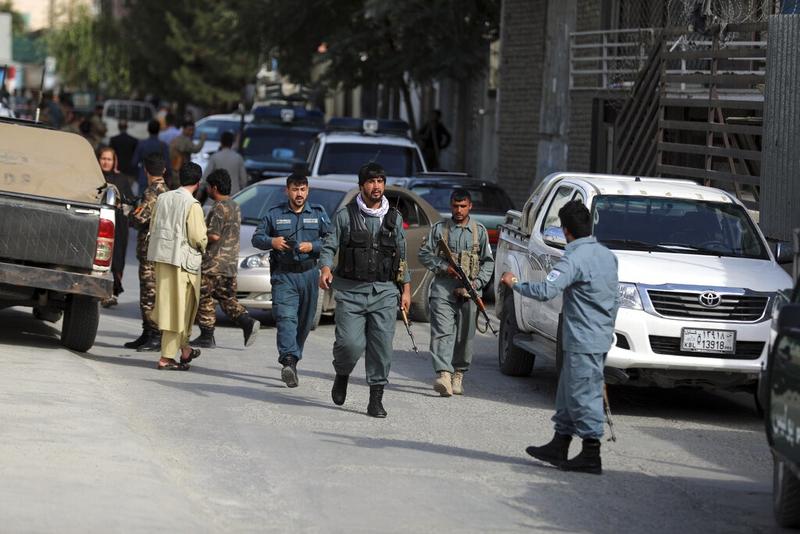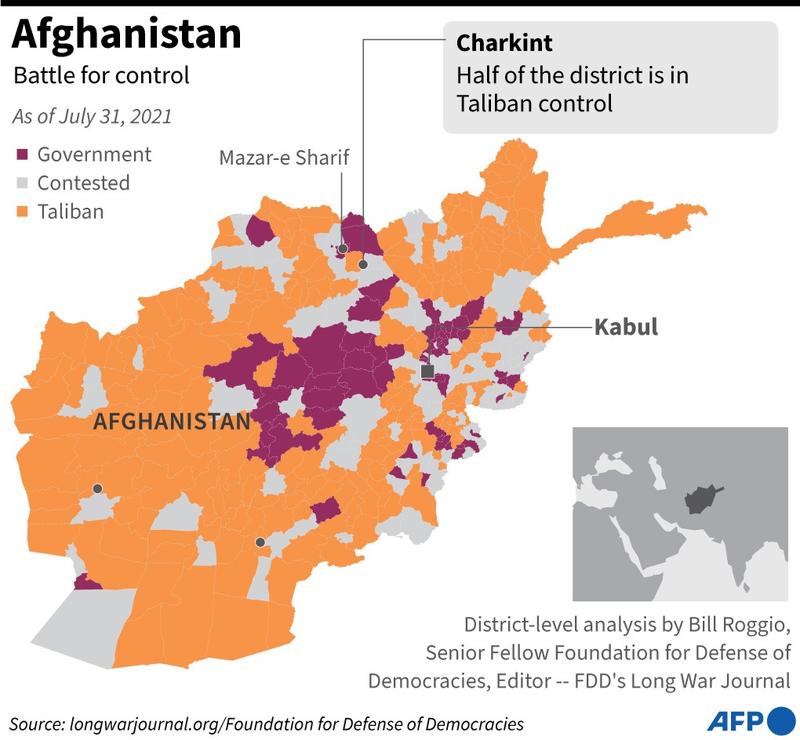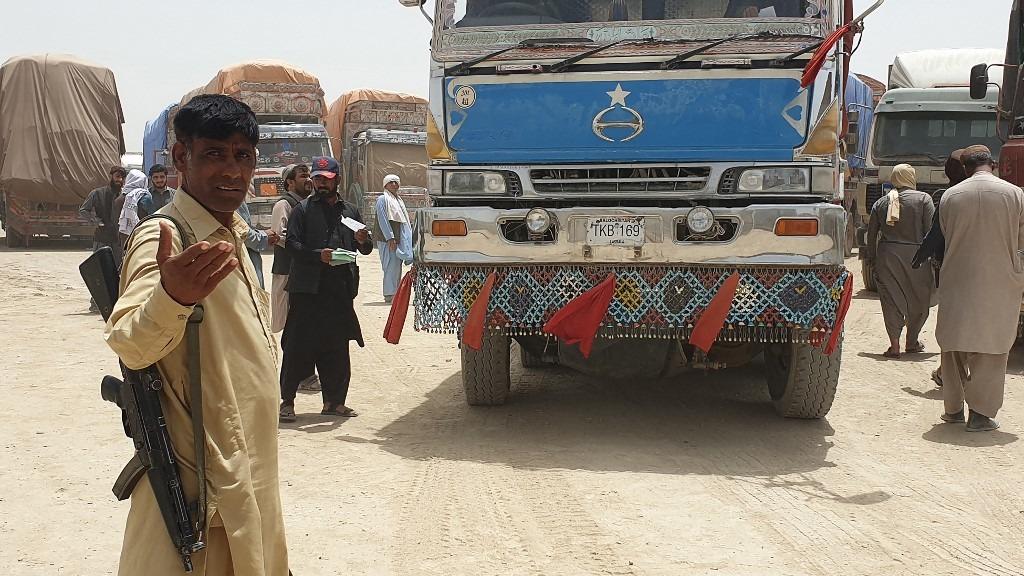 Afghan security personnel arrives at the area where the director of Afghanistan's Government Information Media Center Dawa Khan Menapal was shot dead in Kabul, Afghanistan, Aug 6, 2021.
(RAHMAT GUL/AP)
Afghan security personnel arrives at the area where the director of Afghanistan's Government Information Media Center Dawa Khan Menapal was shot dead in Kabul, Afghanistan, Aug 6, 2021.
(RAHMAT GUL/AP)
KABUL - The Taliban captured an Afghan provincial capital and assassinated the government's top media officer in Kabul on Friday, dealing twin high-profile blows to the Western-backed administration.
A police spokesman in southern Nimroz province said the capital Zaranj had fallen to the hardline Islamists because of a lack of reinforcements from the government.
READ MORE: Drought compounds crisis in Afghanistan as conflict intensifies
Fighting to reimpose strict Islamic law after their 2001 ousting by US-led forces, the Taliban have intensified their campaign to defeat the US-backed government as foreign forces complete their withdrawal after 20 years of war.
Zaranj was the first provincial capital to fall to the group since the United States reached a deal with the Taliban in February 2020 for a US troop pullout. A local source said the Taliban had seized the governor's office, the police headquarters and an ecampment near the Iranian border
The insurgents have taken dozens of districts and border crossings in recent months and put pressure on several provincial capitals, including Herat in the west and Kandahar in the south, as foreign troops withdraw.
Zaranj was the first provincial capital to fall to the group since the United States reached a deal with the Taliban in February 2020 for a US troop pullout. A local source said the Taliban had seized the governor's office, the police headquarters and an ecampment near the Iranian border.
Taliban sources said the group was celebrating, and Zaranj's fall would boost the morale of their fighters in other provinces. A Taliban commander, speaking on condition of anonymity, said it has strategic importance as it is on the border with Iran.
ALSO READ: Foreign missions in Kabul issue joint call for Taliban ceasefire
“This is the beginning and see how other provinces fall in our hands very soon,” he said.
In Kabul, Taliban attackers killed Dawa Khan Menapal, head of the Government Media and Information Centre, in the latest in a series of assassinations aimed at weakening President Ashraf Ghani's democratically elected government.
'An Affront'
In a tweet, US Charge d'Affaires Ross Wilson said he was saddened and disgusted by the death of Menapal, whom he called a friend who provided truthful information to all Afghans.
"These murders are an affront to Afghans’ human rights & freedom of speech," he said.
Scores of social activists, journalists, bureaucrats, judges and public figures fighting to sustain a liberal Islamic administration have been assassinated by Taliban fighters in a bid to silence voices of dissent in the war-torn country.

An official in the federal interior ministry said "the savage terrorists killed" Menapal during Friday prayers.
"He (Menapal) was a young man who stood like a mountain in the face of enemy propaganda, and who was always a major supporter of the (Afghan) regime," said Mirwais Stanikzai, a spokesperson for the interior ministry.
The Taliban closed a key border crossing with Pakistan on Friday, saying no one would be allowed through until Islamabad dropped or relaxed its visa requirements for Afghans
Elsewhere Taliban fighters intensified clashes with Afghan forces and attacked militias allied with the government, officials said, stretching their dominance of border towns and closing in on two provincial capitals.
At least 10 Afghan soldiers and a commander of armed members belonging to the Abdul Rashid Dostum militia group in the northern province of Jowzjan were killed.
"The Taliban launched violent attacks on the outskirts of (provincial capital) Sheberghan this week and during heavy clashes a pro-government militia forces' commander loyal to Dustom was killed," said Abdul Qader Malia, the deputy governor of Jowzjan province.
Another provincial council member said nine of the 10 districts of Jowzjan were now controlled by the Taliban and the contest to control Sheberghan was under way.
Border crossing closed
The Taliban closed a key border crossing with Pakistan on Friday, saying no one would be allowed through until Islamabad dropped or relaxed its visa requirements for Afghans.
 In this picture taken on July 27, 2021, plainclothes security personnel guards as goods trucks prepare to make their way towards the Afghan border crossing point in Chaman, after a key crossing between Pakistan and Afghanistan partially reopened days after the Taliban took control of the Afghan border town in a rapid offensive across the country. (ASGHAR ACHAKZAI / AFP)
In this picture taken on July 27, 2021, plainclothes security personnel guards as goods trucks prepare to make their way towards the Afghan border crossing point in Chaman, after a key crossing between Pakistan and Afghanistan partially reopened days after the Taliban took control of the Afghan border town in a rapid offensive across the country. (ASGHAR ACHAKZAI / AFP)
The Taliban last month captured the southeast Chaman-Spin Boldak border crossing from Afghan forces.
Pakistan initially closed its side of the crossing, landlocked Afghanistan's second busiest entry point and main commercial artery to the sea, before reopening it last week.
But since the Taliban took control of Chaman-Spin Boldak, Pakistani border officials there have begun enforcing visa requirements for Afghans which previously were not as strictly observed.
In a statement on Friday, the Taliban statement called on Pakistan to scrap all visa requirements for Afghans.
"(The crossing) will remain closed for all types of commuting, including transit and trade, for both sides, and pedestrians, until the Pakistani side leaves the gate open, morning to evening, for Afghans holding [Pakistani issued] migration cards or [Afghan] ID cards," the insurgent group's shadow governor for Kandahar province said in the statement.
Taliban spokesman Zabihullah Mujahid said the group's leadership had endorsed the move, and on Friday the border had been closed.
The hardline Islamist insurgents have also taken control of several border crossings, including with Iran and Central Asian countries, but the crossing with Pakistan provides a significant customs revenue.
Ensuring it is open for visa-free travel would not only curry favor with ordinary Afghans but also shore up a route to parts of Pakistan that have historically housed the insurgent group's fighters and part of its leadership.
Afghan government data indicates the route was used by 900 trucks a day before the Taliban seized it.


